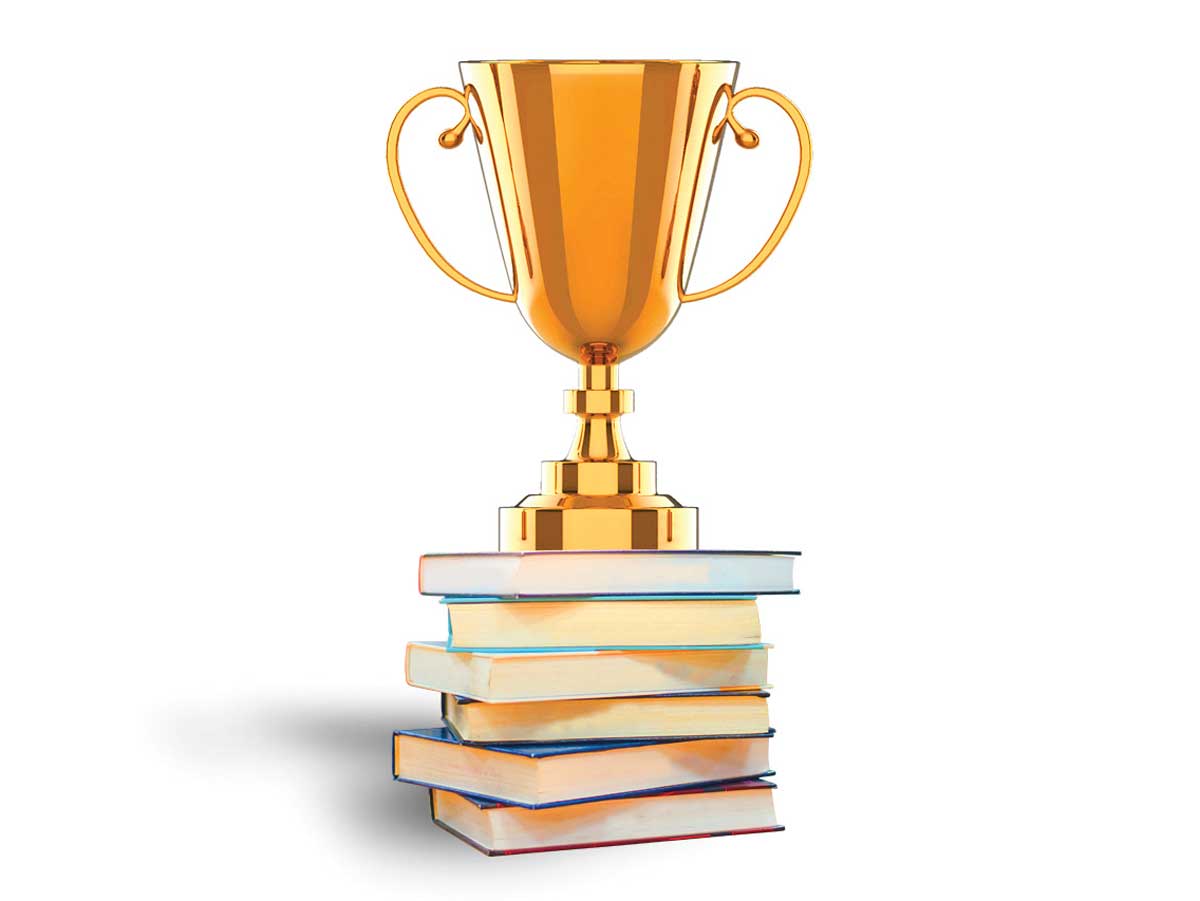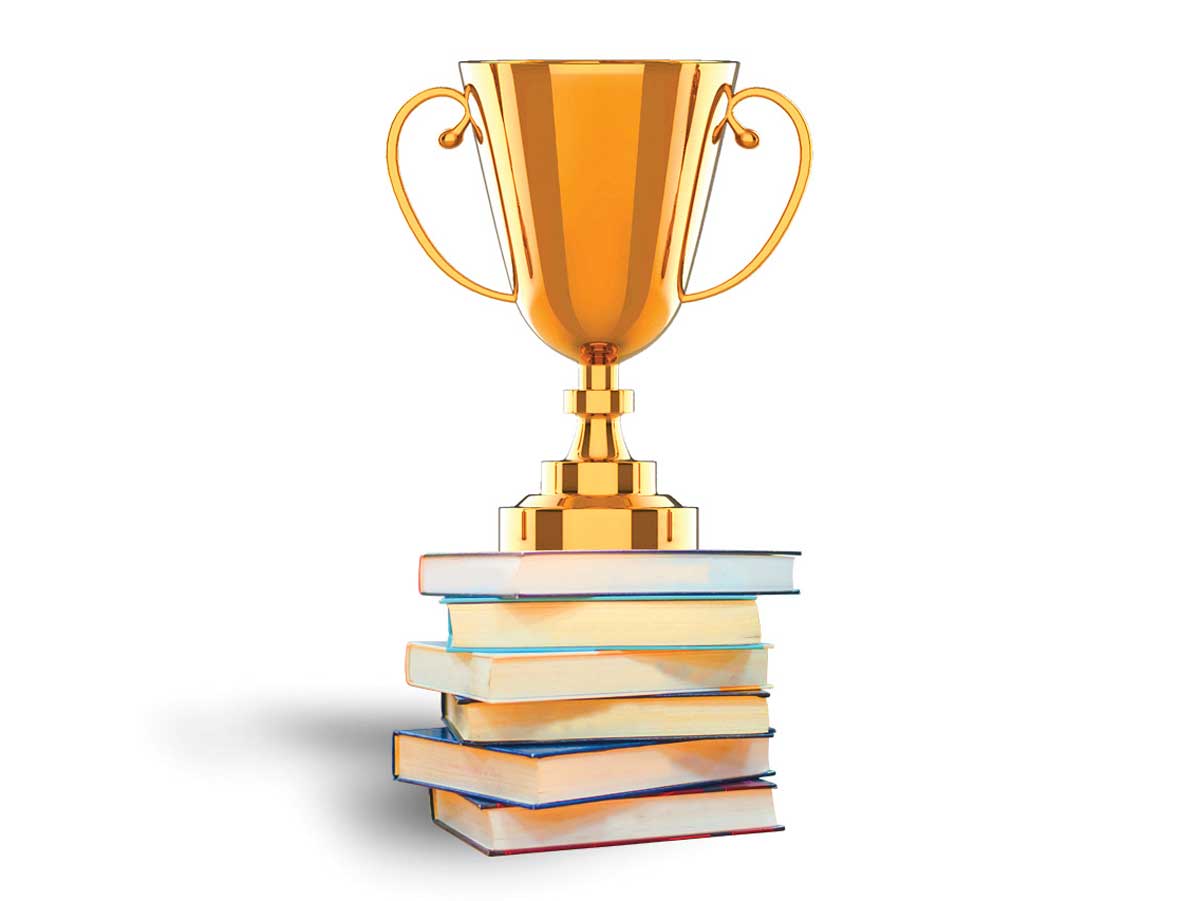
Celebrating 35 years of the National Business Book Awards
 The National Business Book Award turns 35 this year (Books by Getty; trophy by iStock)
The National Business Book Award turns 35 this year (Books by Getty; trophy by iStock)
Literary prizes, the keystone species in the contemporary book world’s ecosystem, do not usually change markedly from year to year. There are new titles and authors, of course, but the gathering of the clan—writers, publishers, critics, sponsors, ordinary (albeit crucial) readers—goes on as always, as does the burst of publicity and tendency of nonfiction nominees to reflect current issues. Unless, that is, there is a milestone anniversary to celebrate with more flourish than usual, or a crowd-dispersing pandemic to wrestle with.
Or both. The National Business Book Award (NBBA) turns 35 this year and wants to throw a party. Mary Ann Freedman, the marketing consultant who took over management of the then-two-year-old award in 1987, had never heard of the NBBA before she was offered the job. Now, “it’s a labour of love,” she says, and the $30,000 prize a major moment on the book world calendar. “I get excited every year by the books and how savvy Canadian business writers are, how their take on world events and trends is so often different than you would read elsewhere.”
Freedman and other observers, including the near-permanent prize jury chaired by former CBC News anchor Peter Mansbridge, can point to decades of writing exploring the business aspects of major socioeconomic change. The award winners haven’t all been business books in the classic sense—corporate histories or entrepreneurs’ biographies. The eminent neuroscientist Daniel Levitin, most famous for This is Your Brain on Music, won three years ago for A Field Guide to Lies: Critical Thinking in the Information Age, while Naomi Klein, no one’s idea of a business writer, took the prize for No Logo in 2001. But the corporate and entrepreneur tales have also flourished, doing best when the story featured a tragic flame-out, the more spectacular the better: Accounts of the fall of the Steinberg dynasty, Nortel, BlackBerry and Conrad Black have all won.
No one has been in a better position to observe the ebb and flow of topics than jury adjudicator Deirdre McMurdy. The former business journalist and policy analyst wryly describes her NBBA role for the past two decades as “doing the grunt work.” She ploughs through the 40 to 50 titles annually submitted for award consideration, “everything from Taxes for Dummies to corporate histories,” looking for the disqualified (ghost-written or sponsored) and weighing the others by the NBBA’s required qualities: originality, relevance, excellence of writing, thoroughness of research and depth of analysis. She then selects and reviews seven to 10 books for the rest of the jury to consider in creating its four-title shortlist.
“Canadian business writers are savvy; their take on world events and trends is so often unique”
There are “fewer books about larger-than-life characters in recent years,” notes McMurdy, partly because most have passed from the scene, and there’s more emphasis on social or economic issues. Three-time NBBA winner Jacquie McNish can agree with that. With her co-authors, she took home the prize for books on Conrad Black and BlackBerry, but she says it is her other winner—The Third Rail: Confronting Our Pension Failures, co-written with Jim Leech—“that has sparked the most conversations I’ve had with people.”
Whatever the theme of the winning book, the NBBA functions like all literary prizes have over the past quarter century. There’s a welcome infusion of cash for the author or co-authors and, more importantly for the other finalists, awards have become the prime driver of speaking opportunities, media interest and consequent income. “What matters is what happens after the slog” of research and writing, says McNish. In short: promotion. “In Canada you don’t make a lot of money [writing books]. The NBBA sheds a lot of light on books that were traditionally filed in the back of bookstores.”
This year’s candidates were all written and published before the coronavirus arrived. Deeply researched books take time, and observers like McMurdy expect to see the first explorations “of whether, and to what degree, the pandemic will demolish present business thinking” next year. Even so, the 2020 finalists neatly capture what the adjudicator sees as emerging trends.
VIVA M.A.C : AIDS, Fashion, and the Philanthropic Practices of M.A.C Cosmetics by Andrea Benoit looks at the Toronto cosmetic company’s embrace, in the form of AIDS-related fundraising during the 1990s, of “cause marketing” before that concept was formally defined. Arlene Dickinson, one of the best-known venture capitalists in the country, gets the nod for what can only be described as an entrepreneurial self-help book, Reinvention: Changing Your Life, Your Career, Your Future. There’s also Living with China: A Middle Power Finds Its Way by academic and former associate deputy minister of finance Wendy Dobson—timely indeed, given the state of Sino-Canadian relations during Meng Wanzhou’s ongoing extradition case. Then there’s a book with subject matter that makes No Logo look like a hymn to capitalism—More Than We Bargained For: An Untold Story of Exploitation, Redemption and the Men Who Built a Worker’s Empire. It’s by John Stefanini, who came to this country from Italy as a poor teenaged immigrant in 1959 and eventually became a giant of Toronto union history.
Small wonder the NBBA and its sponsors, Bennett Jones LLP and Miles S. Nadal, want to mark the occasion (CPA Canada is an Award Ceremony partner of the NBBA.) COVID-19 and the Ontario lockdown permitting, Freedman says, in November the award had planned a larger than usual award ceremony* including “as many past winners as can come.” But it’s a show that will go on, Freedman vows, even if it has to be online—and comes with a Bring Your Own Lunch note.
PICK OF THE CROP
Looking for some great podcasts, books and TED Talks to enjoy during your vacation—and beyond? We’ve got you covered.